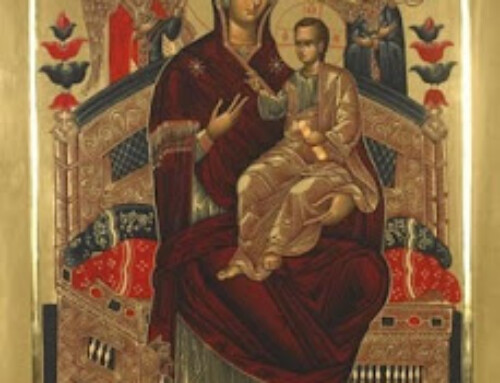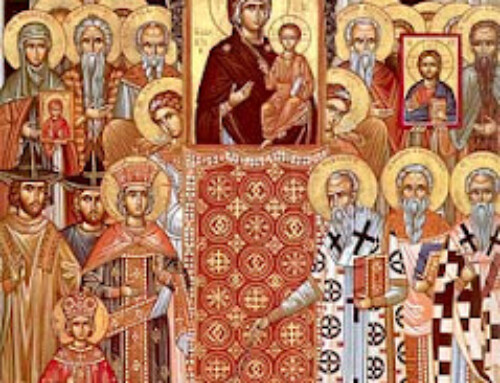Word Magazine March 1959 Page 8/14
THE CHALLENGE OF ORTHODOX
CHRISTIAN EDUCATION
By Sophie Koulomzin
“We are a generation of untaught teachers. . .” The words sounded bewildered and yet held a challenge. Their real meaning was: “Whether we are prepared or not, whether we have training or none — teach we must, for if we do not teach, another generation, and maybe the final one, will be lost for our Church.”
No one could be more conscious of the responsibility and difficulty these words expressed than the group that pondered them in Pittsburgh, Pa. on December 5th and 6th of this winter, at the Serbian church of St. George: forty-three priests and laymen, officially representing the Greek, the Romanian, the Russian, the Carpatho-Russian, the Serbian, the Syrian and the Ukrainian Orthodox churches in this country. They met in an annual conference of the Orthodox Christian Education Commission. This was the third time they met and the general theme was teacher training.
Every conference of this kind leaves one with a mingled sense of inspiration and frustration. There is always such a shortage of qualified leadership, of really good literature that one feels almost helpless in the face of the immensity of the task. There is even uncertainty in the recognition by all concerned of what our main task is. There is the usual irritating lack of concentration and organizational smoothness, for most of the participants are busy priests torn between their parochial duties and the conference meetings. The informational reports seem repetitious and uninspiring. And then as the discussions progress, as we come to grips with problems and difficulties of our work, common to us all, some thought is expressed, one suggestion leads to another, a spark is struck, and suddenly one is conscious of participating in that essentially church action, which is termed “sobornost” in Russian and which can be translated as “the Grace of the Holy Spirit expressing itself through the fellowship of men.”
As I followed the work of the Orthodox Christian Education Commission through the three years of its existence, an important trend became discernible. The Commission works on the assumption that our greatest need is to come to an understanding of what we mean by Orthodox Christian Education. Thanks to the zeal of a generation of young teachers a tremendous volume of work is being carried on, but there is a great need for clearer orientation, for a better understanding of just what is the purpose of this work that should determine all the details of lesson material, curriculum, organization, etc. Most of us would agree that the purpose of Orthodox Christian Education is to make our children good Orthodox Christians, but that immediately leads to another question: what does it mean, here and today, in the United States of America, in the year of Our Lord 1959, to be an Orthodox Christian? What does it means for a fourth-grader in a public school, for a high school teenager in an industrial city or suburban community, for a college student discovering a new world of his own? As an adolescent faces the problems that are of such fierce realism to him or to her — the need of recognition by his peers, revolt against the family pattern of life, the boy-girl relationship, the choice of a vocation — just where is the point of relevance of his Orthodox Christian training, just how do the lessons he was taught in Sunday School, the texts he memorized, the ritual he learned help him to solve these problems? It is not another set of Old Testament Stories or another booklet to explain the text of the Divine Liturgy that is the crying need of today, but trying to understand the basic meaning of what is Orthodox Christian Education. Only this understanding will illuminate and make meaningful our work.
The Church had to answer the needs of its parishes day by day, as they came up, always in a hurry. Textbooks, pamphlets leaflets were published — in a far greater number than anyone who has not made a special study of it would imagine. A leaflet to explain the sacrament of confession, a prayer book for the child who does not understand the language of the church services, a coloring book to occupy the nursery children, a brief catechism that answers “all the questions” (except the ones that really bother the youngsters) are being constantly printed. But somehow the essence of Orthodox Christianity never seems to be vividly and powerfully expressed in these leaflets and booklets. There is more to Orthodoxy, something deeper and warmer, that avoids us, the living Orthodoxy, the Orthodox way of life.
The Orthodox Christian Education Commission is a practical expression of today’s greatest need in our Church life. In Christian fellowship, as members of the One Holy Orthodox Church we must search together for a deeper, a truer concept of Christian education, an education that would be “a living communion with a living tradition” (Father A. Schmemann). This deeper concept of Christian education will be reflected in all its aspects — teacher training, Sunday School work, Home education, youth work, adult education, etc. It will influence the material and curricula produced by the individual churches. Spade-work done along these lines will have a far greater practical value than producing one more textbook among the many existing ones.
This new approach is not something that anyone “knows all about” and can pass along. It is something that has to be worked at, tried again and again, thought through, felt through, pursued with humility and courage and faith, sought after with an alert intellectual eagerness. In other words the task of Christian education is exactly as difficult, as “life-consuming” as the task of living a Christian life.
The recent conference of the Orthodox Christian Education Commission planned certain practical contributions to the task of teacher training evolving from these basic principles. One of the sub-committees prepared a booklist for a Sunday School teacher’s library, containing about one hundred titles of books on Orthodoxy, arranged topically, with brief evaluations. This list will be published in the winter issue of the Bulletin of Orthodox Christian Education together with a list of recommended audio-visual aids and a full listing of existing textbooks.
Another project planned for the summer issue is a Teacher Training Manual that could be used by all Orthodox Churches.*
Surely these efforts are very modest just as the Commission’s shoestring budget, or the small number of volunteers carrying on the work. However puny they are, we can always take comfort in the words of the Apostle that His strength is made perfect in weakness.
* A full report on the Pittsburgh conference will be found in the 1959 Winter issue of the Bulletin of Orthodox Christian Education.




